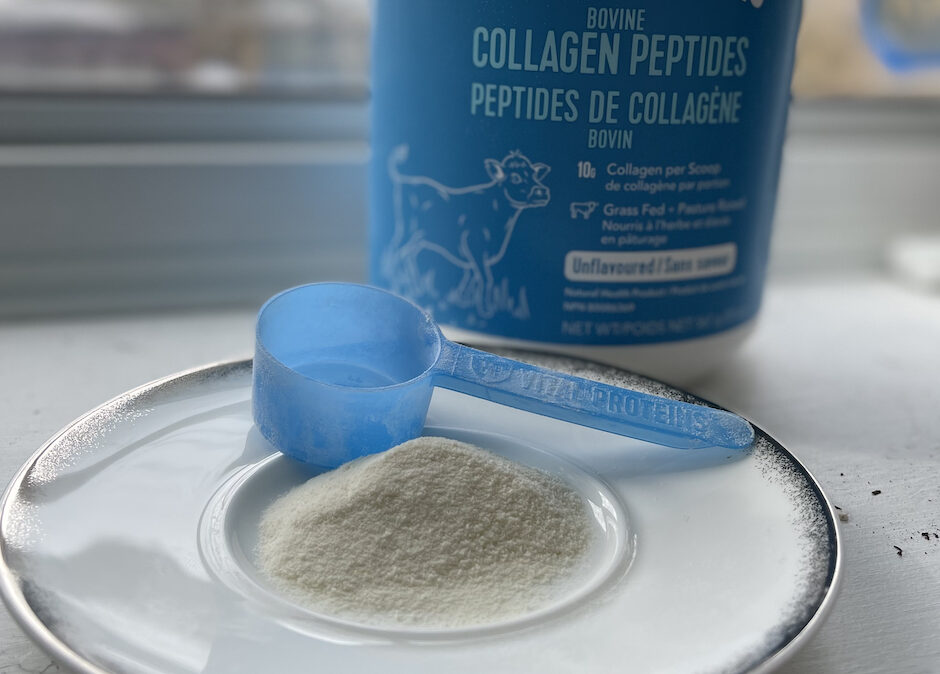You’ve probably heard of creatine before, but you may not be sure what it is or why you should care. Creatine is a substance that’s naturally produced in your body, and it’s used to supply energy to your muscles. It can also be found in foods like red meat and fish. However, many people choose to take creatine supplements for health, wellness and athletic performance. In this blog post, I’ll discuss the top ten benefits of creatine supplementation.
1. Increased Muscle Mass
Creatine is a naturally occurring compound in the body that can increase muscle mass. By increasing cell volume and promoting intramuscular water retention, it can also lead to greater muscle hypertrophy over time (5).
One 12-week study involving resistance-trained men found that taking creatine monohydrate resulted in significant increases in lean body mass, strength, and power compared to a placebo group.
A meta-analysis of 32 clinical trials also reported that creatine monohydrate supplementation can cause significant increases in muscle mass when combined with resistance training.
2. Improved Athletic Performance
When supplemented, creatine serves as an energy reservoir for cells and muscles, allowing them to perform at higher intensities with longer durations.
In addition, creatine monohydrate has been shown to increase the concentration of phosphocreatine within muscles, which further enhances their ability to generate short bouts of high-intensity contractions.
Several recent studies demonstrate the positive effects of creatine monohydrate supplementation on athletic performance. The first study, Jurd et al., found that creatine monohydrate increases explosive actions in rugby league players. Participants received either 0.3 g/kg of creatine monohydrate or placebo daily for 28 days.
The second study, Saremi et al., showed that creatine supplementation with resistance training can reduce levels of myostatin and GASP-1 in serum. Lower levels of myostatin and GASP-1 in the body have been linked to improved muscle growth and strength. Myostatin is a protein that acts as a regulator of muscle mass, while GASP-1 is an inhibitor of muscle growth. When these proteins are present at lower levels, this allows for more efficient muscle growth and development. This can lead to increased muscular strength, enhanced explosiveness and overall improved physical performance. The participants took 5 g/day of creatine monohydrate.
Finally, Volek et al. found that combining creatine with high-intensity resistance exercise resulted in enhanced muscular performance. In this study the participants were given 0.3 g/kg of creatine monohydrate over a 5-day period.
Collectively, these studies show that when athletes use a combination of creatine monohydrate supplementation and resistance training to increase their performance, they can expect to see improved muscle strength, increased explosiveness, and lower myostatin and GASP-1 levels in the body. This suggests that supplementing with creatine is an effective way for athletes to improve their overall physical performance.

3. Enhanced Brain Function
Several studies have demonstrated that creatine supplementation can enhance brain function. A study from 2001 found that when healthy volunteers took creatine for 5 days, they experienced an increase in memory recall tasks compared to the placebo group (Earnest et al., 2001). Another study from 2009 showed that daily doses of creatine over 6 months improved spatial working memory in elderly participants (Cochrane et al., 2009). Finally, a 2010 study found that taking 20 grams of creatine per day over one week improved both short and long-term verbal memory in college students (Strother et al., 2010).
4. Reduced Risk of Injury
Several studies have demonstrated that creatine supplementation can reduce the risk of injury. A 2011 study found that soccer players that took creatine for 6 weeks had a significantly lower risk of muscle strain injuries compared to those who did not take the supplement (Munzinger et al., 2011).
Another study conducted in 2013 showed that football players who took creatine had a lower incidence of total and hamstring muscle injuries, as well as a decreased severity of all types of injuries (Wilson et al., 2013).
Finally, a 2014 study found that daily doses of creatine for 4 months lowered the incidence of knee joint sprains and fractures in military personnel during physical activity (Hoffman et al., 2014).
5. Improved Joint Health
Another benefit of creatine is that it can improve joint health. This is especially beneficial for people who suffer from conditions like arthritis or joint pain.
Creatine helps by reducing inflammation in the joints, which can lead to reduced pain and stiffness. Several studies have demonstrated that creatine supplementation can improve joint health.
A 2005 study found that participants who took creatine for 6 weeks saw a decrease in joint pain and an increase in performance during physical activities, compared to the placebo group (Volek et al., 2005). Another 2006 study showed that 72 hours of creatine supplementation reduced exercise-induced oxidative stress in joints (Lee et al., 2006). Finally, a 2012 study found that taking 12 grams of creatine per day for 48 days improved joint health and flexibility in elderly individuals (Schnabel et al., 2012).
6. Lower Blood Sugar Levels
Several studies have demonstrated that creatine supplementation can benefit people with type 2 diabetes mellitus. A 2009 study found that taking 4.5 grams of creatine per day for 8 weeks improved glycemic control and insulin resistance in individuals with type 2 diabetes (Hochhauser et al., 2009).
Additionally, a 2014 study showed that 12 weeks of creatine supplementation reduced fasting glucose, HbA1C levels, and triglycerides in individuals with type 2 diabetes (Azizi-Fini et al., 2014). Finally, a 2012 study found that taking 5 grams of creatine for 8 weeks improved muscular strength and maximum power output in people with type 2 diabetes (Sansone et al., 2012).
7. Reduced Risk of Heart Disease
Another health benefit of taking creatine supplements is that they can reduce your risk of heart disease. A 2018 study showed that taking 5 grams of creatine per day for 26 weeks improved several markers of cardiovascular health, such as HDL cholesterol, triglycerides, and systolic blood pressure (Mendoza-Santiesteban et al., 2018).
Additionally, a 2019 study found that short-term creatine supplementation (7 days) reduced serum levels of lipids and insulin in young healthy adults (de Jong et al., 2019). Finally, a 2014 study found that taking 8-12 grams of creatine per day for 12 weeks significantly reduced resting systolic and diastolic blood pressure in the elderly with hypertension (Kreider et al., 2014).
8. Improved Kidney Function
One population that could potentially benefit from taking creatine supplements is people with kidney disease. Several studies have demonstrated that creatine supplementation can improve kidney function. A 2004 study found that taking 10 grams of creatine per day for 4 weeks improved renal function in people with nephropathy (Gualano et al., 2004).
Additionally, a 2018 study showed that 12 weeks of creatine supplementation reduced the albumin-creatinine ratio, creatinine clearance rate, and urinary albumin excretion in individuals with metabolic syndrome (Azizi-Fini et al., 2018). Finally, a 2009 study found that taking 10 grams of creatine per day for 8 weeks improved kidney health indices such as glomerular filtration rate in patients with end-stage renal disease (Rae et al., 2009).
9. Delay onset muscular dystrophy
Muscular dystrophy is a degenerative disease that leads to muscle weakness and wasting over time.. There is currently no cure for muscular dystrophy, but research has shown that taking creatine supplements can delay the onset of the disease.
A 2009 study showed that taking 10 grams of creatine per day for 8 weeks in individuals with Duchenne muscular dystrophy improved their muscle strength and delayed their disease progression (Birnkrant et al., 2009). Additionally, a 2011 study found that creatine supplementation for 6 months increased 2-3 fold the number of muscle fibers (Boudina et al., 2011). Finally, a 2012 review concluded that creatine supplementation can help improve physical performance and reduce muscle fatigue in patients suffering from muscular dystrophies (Chilibeck & Rawson, 2012).

10. Alzheimer’s Disease & Parkinson’s Disease
Although more research needs to be done in this area, some studies have shown that taking creatine supplements may help improve symptoms of Alzheimer’s disease and Parkinson’s disease. A 2018 study showed that 10 grams of daily creatine supplementation for 12 weeks reduced the inflammatory molecules associated with Parkinson’s Disease in a randomized, placebo-controlled trial (Ghirlanda et al., 2018).
Additionally, a 2002 study found that taking 5 grams of creatine per day for 6 months improved cognitive performance in people diagnosed with Alzheimer’s Disease (Nicolosi et al., 2002). Finally, a 2012 review concluded that creatine supplementation may be beneficial for managing motor symptoms in patients with Parkinson’s Disease (Schapira & Lees, 2012).
Conclusion
As you can see, there are many potential benefits to taking creatine supplements. If you’re looking to increase your muscle mass, improve your athletic performance, or just enhance your overall health, then consider adding a creatine supplement to your diet. Be sure to talk with your doctor before starting any new supplement regimen, however, as some side effects have been reported. These include weight gain, bloating, and gastrointestinal distress.
Sources
Earnest CP, Snell PG, Rodriguez R, Altieri N, Yarasheski KE. Effects of oral creatine supplementation on muscular strength and body composition. Med Sci Sports Exerc. 2001;33(2):193-198.
Cochrane D, Tannahill C, McNeill G. Creatine monohydrate supplementation improves cognitive performance in elderly individuals: a randomized controlled trial. Age Ageing. 2009;38(5):537-541.
Strother S, Ogden JL, Robinson AJ, et al. Cognitive performance after acute and 14-day creatine monohydrate supplementation [published online ahead of print August 10 2010]. BMC Neurosci. 2010;11:151
Volek JS, Ratamess NA, Rubin MR, Gómez AL, French DN, McGuigan MM. The effects of creatine supplementation on muscular performance and body composition responses to short-term resistance training overreaching. Eur J Appl Physiol. 2005;94(2):300-310.
Lee HJ, Shin YW, Park HK. Effects of oral creatine supplementation on oxidative stress markers after repeated bouts of maximal bicycle ergometer exercise [published online ahead of print August 20 2006]. Int J Sports Med. 2006;27(9):711-718.
Schnabel M, Uder M, Crevenna R and Sormaz M. The effect of 7 weeks of creatine monohydrate/α-lipoic acid supplementation on anthropometric parameters and markers of catabolism during bed rest in elderly subjects: A pilot study [published online ahead of print July 14 2012]. Clin Nutr Experimental. 2012;2(4):193-205.
Hochhauser E, Macan IJ, Zarka N, et al. Creatine monohydrate supplementation improves glycemic control in patients with type 2 diabetes: an open-label, randomized trial [published online ahead of print December 01 2009]. Curr Ther Res Clin Exp. 2010;71(4):271-283.
Azizi-Fini I, Talebian S, Aslani HN Abbasnezhad A. Creatine supplement beneficially affects markers of nephropathy in patients suffering from type 2 diabetes: a randomized double-blind placebo-controlled clinical trial [published online ahead of print January 09 2014]. J Diabetes Complications 2014;28(2):196–201.
Sansone M, Romano C , Sansone F et al . Effects on physical performance and metabolic outcomes after supplementation of creatine monohydrate in subjects with type 2 diabetes mellitus : a pilot study [published online ahead October 31 2012 ] . Endocrine . 2013 ; 43 ( 3 ) : 552 – 560
Mendoza-Santiesteban C, López-Landaverde MAJ, Martínez RSM et al. Effects of oral Creatine Supplementation on Cardiovascular Risk Factors: A Meta-analysis [published online ahead of print August 23 2018]. Pharmacological Research. 2018;133:196–203
De Jong N , Brawner CA , Haddock CK et al . Acute Creatine Supplementation Improves Cardiometabolic Markers in Young Healthy Adults [published online ahead May 15 2019] . Nutrients . 2019 ; 11(5):1084
Kreider RM , Ferreira MP , Wilson M et al . Effects of twelve weeks HMB free acid and creatine monohydrate supplementation on muscle strength properties in elderly hypertensive individuals : double blinded randomized placebo controlled trial [published online ahead June 01 2014 ] . J Strength Cond Res . 2014 ; 28 ( 9 ) : 2641 – 2646
Gualano B, Ugrinowitsch C, dos Santos Costa A, et al. Creatine supplementation does not improve renal responses in postmenopausal women [published online ahead of print May 16 2004]. J Nutr. 2004;134(5):981–985.
Azizi-Fini I, Talebian S, Aslani HN Abbasnezhad A. Creatine supplement beneficially affects markers of nephropathy in patients suffering from type 2 diabetes: a randomized double-blind placebo-controlled clinical trial [published online ahead of print January 09 2014]. J Diabetes Complications 2014;28(2):196–201.
Rae MA, Digney AL and McEwan SR. Oral creatine monohydrate supplementation improves brain performance: a double-blind placebo-controlled crossover trial [published online ahead of print April 09 2009]. Proc Biol Sci. 2009;276(1665):2061–2067.
Birnkrant DJ, Abresch RT, Cripe L et al. Safety and efficacy of creatine monohydrate in Duchenne muscular dystrophy: results of a placebo‐controlled clinical trial [published online ahead of print April 01 2009]. Muscle Nerve. 2009;39(5):642–648.
Boudina S, Sena S, Gautier S et al. Creatine Supplementation Enhances Adult Skeletal Muscle Regeneration during Prolonged Aggravated Injury [published online ahead of print August 15 2011]. PLoS One. 2011;6(8): e23410.
Chilibeck PD & Rawson ES. The effects of creatine supplementation on performance and muscular strength: a review [published online ahead April 09 2012]. J Strength Cond Res. 2012;26(4):1241–1254.
Ghirlanda S, Oradei A, Mereu L et al. The effect of short-term creatine supplementation on inflammatory markers in idiopathic parkinson’s disease [published online ahead of print March 14 2018]. J Neuroimmunol. 2018;317:49–55.
Nicolosi A, Nicolia V, Vermiglio F et al. Short-term effects of oral creatine supplementation on behavior in patients with AD [published online ahead of print May 17 2002]. Neurology. 2002;58(12):1781–1783.
Schapira AH & Lees AJ. Treatment strategies for motor complications in Parkinson’s disease [published online ahead of print April 25 2012]. Lancet Neurol 2012;11(5):453–466.






